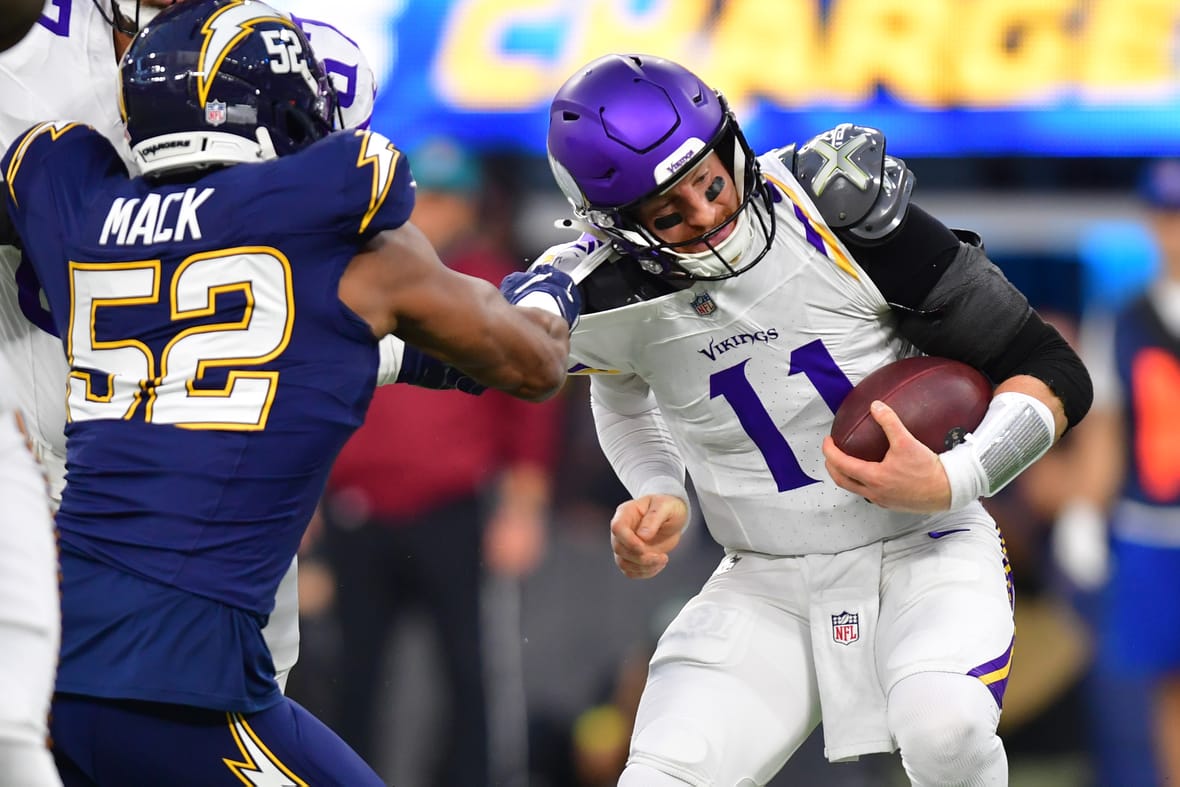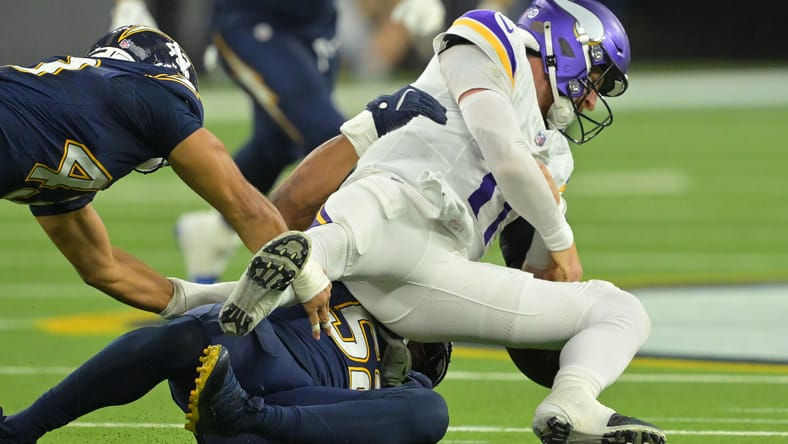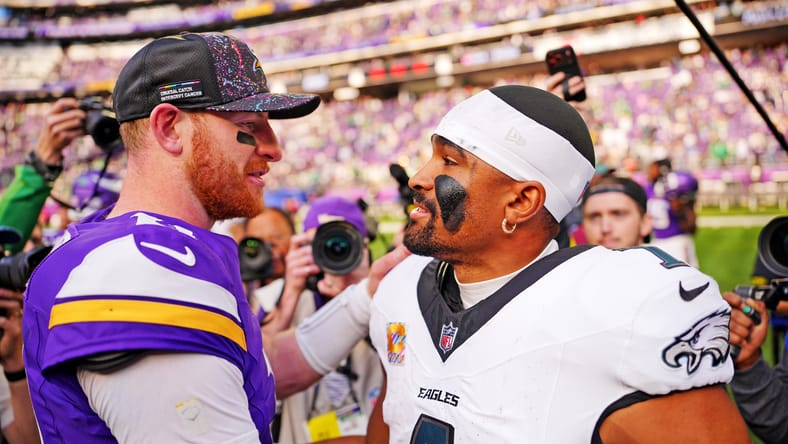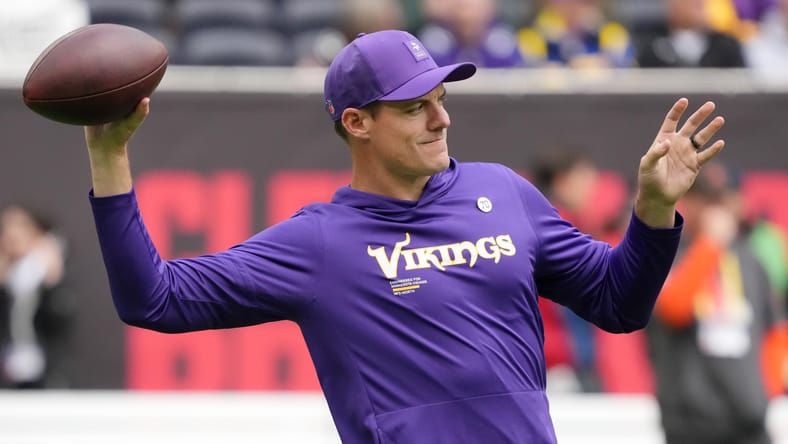
One word to describe the Carson Wentz experience could be eventful. The veteran passer signed with his childhood team about two months ago, but the hope was that he wouldn’t see the field because J.J. McCarthy is the QB1 and remains healthy. Well, he didn’t, and Wentz has started the last five games. His play was up-and-down, and his injured shoulder has just landed him on IR, as he is awaiting surgery.
Turns Out Carson Wentz Is Not an Idiot
On Thursday’s big national stage, Wentz, who was dealing with a shoulder injury to start the game, was beaten up all night by a surprisingly ferocious Chargers pass rush. In the fourth quarter, the passer grimaced after every pass and was in obvious pain, even throwing his helmet onto the sideline.
Despite the game being an obvious losing effort, and there was nothing really left to gain, he kept trotting out there every time the Vikings received the ball. Backup Max Brosmer relieved him for the final two minutes.

The fourth quarter that reminded folks of an unnecessarily dragged-out torture scene in an R-rated movie has drawn some criticism about whether head coach Kevin O’Connell should’ve pulled the plug way earlier than that.
A few days later, the public learned that the signal-caller suffered a torn labrum, a dislocated shoulder, and a socket fracture in London’s game against the Cleveland Browns and played the following two contests, including Thursday’s beatdown, with that injury.
On Wednesday, the injured backup addressed the local media for the first time since his post-game presser on Thursday, and he dismissed any O’Connell controversy.
“We were talking the whole time,” Wentz said about Thursday’s process. “The trainers, coach, everyone was just like, ‘How are you doing?’ and I’m like, ‘I’m good.’ At the end of the day, it was painful, but I didn’t want to remove myself from that. It’s also one of those things, I’ve mentioned it already, I was a backup for the last couple of years, so just being back in the role of starting meaningful football games, it’s fun. It’s what I grew up dreaming of doing. And when you lose it a little bit, it’s hard to want to give it up.”

Wentz stressed that he knew the surgery would have to take place at some point, but he and the people in charge wanted to push it back as long as possible.
About whether he should’ve been taken out, Wentz said, “Truthfully, no. I appreciate that everyone was checking on me. Coaches, trainers, no one really knows the level of pain or difficulty that I may be feeling, and I know TV copies can show stuff that people on the sidelines don’t see. But I never once felt unsafe.”
Wentz was asked to keep the team alive, and he delivered a 2-3 record. The classic benchmark fans often use for backup QBs is to go .500 when the starter is unavailable. In his five-game sample, Wentz tabulated 1,216 yards and six touchdowns through the air. He came close enough to the record and the statistical output one can expect from a backup to appreciate his services.
A reporter then wanted to know whether the shoulder got worse over the course of the 2.5 games he played with the injury: “I don’t think so. There’s the trainers here, people I have consulted with on the outside, my agent, everyone I’ve talked to, [said], ‘This thing is going to get fixed.’ I’m gonna be okay. I’m not done. It’s just a bummer for this season.”
It’s always important to balance the short-term desire to be out on the field with the potential long-term implications for a player’s health. Wentz, however, didn’t feel like the long-term risks were there.
“Did it become worse that it can’t be fixed? No, by no means. I wouldn’t have been out there if that was the case. Truthfully, that was the number one question I had for everybody, ‘Can this get worse? What’s the concern?’ And it was a resounding, it’s going to be uncomfortable, and up to you. So in that case, I said, well, let’s roll and see how long we can go.”
Wentz, who has gained experience with injuries over the years, claimed he knew what he was doing the whole time.
“This isn’t my first rodeo, I’m not an idiot, I know what I was signing up for. Nobody was forcing me, pressuring me, any of those things. Anybody in this building, everybody’s handled this tremendously. Communication has been phenomenal.”

Still, O’Connell has been on the receiving end of a lot of criticism over the last few days. Wentz, meanwhile, doesn’t think any of that is warranted.
“I don’t know, maybe the public backlash that I’m being told are out there, I think it’s kind of crazy. Nobody is in this building, nobody is in these conversations, nobody knows what’s truly going on and transpiring behind these walls, and I can honestly say this place has been super supportive and super helpful this whole time, and I’m grateful for that.”
The optics weren’t great; seeing a player in pain on national television while his replacement stood on the sidelines was reason to raise eyebrows. However, both O’Connell and Wentz keep insisting on the story that he wanted to stay in the game, and that should end the conversation.
The 32-year-old will not suit up for another game this year, but he’s confident he’ll be back for OTAs next offseason. Whether that will be in the Twin Cities or elsewhere, remains to be seen. His one-year deal will expire in March.
Editor’s Note: Information from PFF, Over The Cap, and Sports Reference helped with this article.


